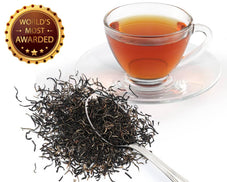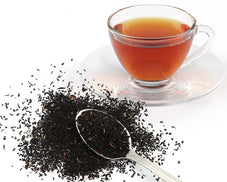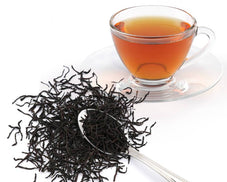
Benefits of Black Tea
Black tea is one of the most popular teas in the world. The English love it and use it as a constant ingredient in many of their breakfast teas. Black tea comes from the same plant that green tea, white, and oolong tea come from. But if you notice, black tea has a distinctively strong flavour and characteristically dark colour. How is this so?
Well, you see, the main difference lies in how black tea is processed. While in making green tea, the leaves of the Camellia sinensis plant are first dried and then gently steamed, black tea leaves undergo far more processing steps.
First, the leaves are withered. Then, they are rolled around to release the beneficial polyphenols present in the leaves. Next, the leaves are left out in the open and exposed to heat and humidity to start the fermentation process. After full oxidation or fermentation is done, the leaves are then dried and packed.
All these processing methods actually account for the uniqueness of black tea. The taste may range from brisk to astringent to delicately fruity, flowery, or even smoky. Often, these differences can be ascertained from the growing regions where the black tea is produced. But regardless of taste, flavour, and colour, the benefits of black tea remain constant.
For thousands of years, the Chinese (who are attributed to be the first tea drinkers) have been imbibing this drink for its many health benefits. Green tea, especially, with its refreshing delicate taste, is said to help in overcoming certain diseases from the simplest headaches, stomach pains to the complex heart disease, cancer, arthritis, etc.
Scientists believed that the reason green tea is more beneficial compared to other teas is that the leaves never undergo full oxidation. Because of this, the polyphenols, especially the polyphenol ECGG, remain intact and potent against disease-causing free radicals in the human body. However, more recent studies have shown that while itís true that full oxidation does break down ECGG, the benefits of black tea are hardly hinged on the presence of that chemical compound.
Researchers found that the benefits of black tea are directly associated with certain chemical compounds that give black tea its characteristic fruity flavour and dark colour. These compounds called theaflavins and the aborigines are polyphenols with antioxidant properties that can help rid the body of harmful free radicals.
In a study done at the American Heart Association in New Orleans, researchers also found that the benefits of black tea may include lowering the risk of heart attack and stroke. According to their findings, certain compounds found in black tea help relax and expand the arteries, thus increasing blood flow to the heart and minimizing clogging of the arteries. The eight-week study on the benefits of black tea involved 50 men and women with coronary artery disease. They drank four cups of either water or tea a day for four weeks. The result was that the group who drank black tea produced more nitric oxide the chemical released by the body that causes the artery to dilate which accounted for their arteries to dilate normally.





